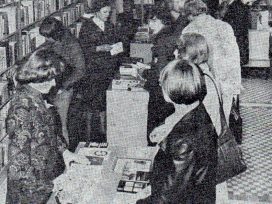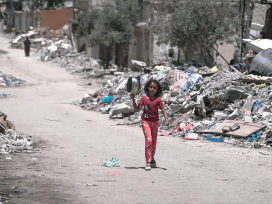The Israeli writer Avraham B. Yehoshua is known not only as the author of a host of novels now considered classics of modern Israeli literature, but also as a daring and straightforward commentator on Israeli politics and society. A master of psychological fiction often compared to Kafka and Faulkner, Yehoshua is also a convinced Zionist who claims that Judaism in the diaspora is a mere ersatz for true Jewish existence. An uncompromising critic of Israeli policy on the occupied territories, on the other hand he is a realist who admits that Israel could never have been born and cannot not persist without war. His first novel The Lover, the story of a complicated tangle of human relationships set against the background of the Yom Kippur war, was recently published in Czech. We met in Prague to speak about his book and Israeli literature today, yet as is often the case with Israeli authors, the conversation soon turned to politics.
Marek Seckar: What was the main impulse for your writing of The Lover? It seems to be closely connected to the Yom Kippur War.
A. B. Yehoshua: In a certain way, this book stands at the beginning of my carrier as a novelist. Before, I was writing short stories and plays, and only then did I feel prepared to write a novel. Of course, The Lover was written in the shadow of the Yom Kippur War, but I also wanted to demonstrate the changes that were under way in Israeli society at the time. After the Six Day War, Israel lost its unifying ideology and the society started to split into different ideological, religious and social factions. Before that, especially when Israel was founded, society had looked quite homogenous. Most social, ideological and religious discrepancies and differences were concealed by the dominant ideology, which in a democratic way directed the whole country. But after the Six Day War, which was a great victory for Israel, all these factions emerged and began and society began to crumble into many different groups. In order to express the soul of Israel at that time, I decided to use a variety of monologue voices, many kinds of voices coming from different people expressing different views. All these people create a kind of mosaic that is Israel.
MS: It is obvious that each character represents a certain component of Israeli society, a particular stone in the mosaic you are speaking about. But Gabriel, the lover himself, seems to be a very strange stone, one that doesn’t really fit in the mosaic you are creating.
ABY: It’s true that at the time he didn’t represent any particular group, but today there are already lots of Israelis who have decided to leave Israel and live elsewhere. He represents them to a certain extent. A person who feels overfed with ideologies, overfed with the duties of being an Israeli. We had been a very committed and ideological society. In order to create the state out of nothing after the Holocaust, and in order to deal with the predominance of the Arabs, who totally denied our right to live in Palestine, we created a very solidaristic and ideological society. Of course, this is a burden on the individual. So Gabriel is a dodger who doesn’t want to assume any of the big duties ensuing from the fact of living in Israel. When I created him in the 1970s, he looked quite peculiar. But in the past few years, I have seen many people like him in Israel – people who can live in Israel, but are not willing to identify with the state’s concerns.
MS: Back to your novel: was this splitting of Israeli society the only subject that you wanted to deal with?
ABY: There is also the question of missing persons. It was in the Yom Kippur War that this phenomenon appeared for the first time. The war came suddenly to Israel, nobody expected it. Even one or two days before the war, nobody knew there would be a major attack on Israel. Then when the war came, it created chaos in the country, especially on the front lines. Before the reserves could be deployed, many soldiers were captured; there were also soldiers who simply disappeared and nobody knew what happened to them. Even now, thirty years later and with the peace treaty with Egypt, there are still some soldiers missing for unknown reasons. My idea was that perhaps one of the soldiers took advantage of the chaos in order to run away from his family, to detach himself from Israel, to liberate himself from all his duties. This was the idea that I had at the beginning, the spark that lit the flame of the writing.
MS: As an Israeli author, the questions you are asked usually concern political and ideological issues, while literature and creation itself are mostly ignored. Even now, in an interview for a literary journal, the debate inevitably turns to political problems. Don’t you think this approach can misrepresent the reception of your work? And is completely apolitical, non-committed literature even possible in Israel?
ABY: It’s a destiny, what can we do? From the very beginning, our country has been in conflict. Even now, after fifty years of existence, Israel is being threatened and there are attempts (by Iran, for instance) to erase the country from the map. Of course, wars are common in human history. But usually the conflicts are finally solved – like WWII in Europe, the war in the Balkans, even the conflict in Northern Ireland has probably reached its end. Only in the Middle East does the conflict seems continuous. So Israeli intellectuals must be always involved, especially after the Six-Day War, when we started our ideological campaign within the Israeli society, saying that the Palestinians have the right to their own state. Although the two-state solution has accepted by the whole world and by most Israelis, there are still many difficulties, like the settlements or Hamas, so we always have to react. Even if writers do not deal with politics and ideologies in their work, they still deal with moral questions while handling human relationships. Whenever a writer describes two people together, there is always a moral component. So it’s quite natural that people ask us what we think about different issues. You cannot say “I’m not a politician, this is not my problem”, because you’re not asked for political answers, you are asked for a moral judgement and that is something you cannot run away from. I’ve never participated in real political life, but I’ve always made moral judgements. Although I am 72 years old and am really tired by all this, I cannot refuse it because I feel it as a duty.
For this reason, there is no apolitical literature in Israel. Even when someone ignores the situation and isn’t willing to deal with it, it also becomes a political attitude.
MS: In the book you describe Israel as a restless country that is always on the move. What does this say about Israeli society?
ABY: We really are a restless country. The Jews in general have always been restless. We have always been crossing borders, going from one country to the other, always on the move. Even now, when so many Jews have come to live in Israel, the fluctuation is still enormous and the population is very diversified and constantly changing. But it was precisely the Yom Kippur War that caused this enormous restlessness: the shock and anger at a government that was unable to foresee the oncoming war, that didn’t understand what was happening – it was like stirring up a hornet’s nest. And it was also caused by the fact that so many soldiers were in service, especially the reservists. The Israeli army still depends on reservists: most soldiers are normal working people. Take the Gaza operation at the beginning of this year, for example. Both my sons were mobilized, although one is 39 and has three children and the other has two children. So this is a normal thing, that regular people have to leave their families, leave their jobs and go to the army. It always creates chaos, and after the Yom Kippur War the people were mobilized for many months.
MS: You are known as an enthusiastic Zionist. You have even compared Judaism in the diaspora is masturbation.
ABY: It was possibly too sharp an expression, but I just wanted to say that in Israel we are facing the real thing: we don’t just read texts in synagogues and say this is Judaism. Our Judaism tries to answer the difficult questions of everyday life.
MS: Do you mean that for Jews, the real thing now happens only in Israel? That the diaspora has become marginalized?
ABY: In a certain way. I can explain that masturbation comparison as follows: You can take a Playboy and look at naked women and have your fantasies, this is all possible; but when you meet a true woman, you have to deal with a real person, you cannot just imagine. If we transfer this example to the moral of Judaism, you can live in Prague and go to a synagogue and listen to a sermon about how great Judaism is. But then you go to Gaza and you have to decide if you are going to hit civilians in order to save the lives of your children, of your soldiers. This is a real dilemma: you have to decide yes or no. When you are approaching a house and you are afraid that there are the people from Hamas, but there are also civilians, because the Hamas are always intermingling with civilians. So are you going to hit the house at a distance, or are you going to approach it, in doing so risking the lives of your soldiers? This is a dilemma. By hitting the house at a distance you might kill civilians as well, as happened in Gaza, but you will save the lives of your soldiers. These dilemmas are real ones and these decisions make today’s Judaism because they shape our moral thinking.
MS: Some Jews completely reject this kind of thinking. Göran Rosenberg, a Jewish-Swedish author, claims that by creating the State of Israel, Jews enclosed themselves into a new ghetto, that they created a stronghold against their neighbours and the whole world. Rosenberg says that Zionism is not a solution for future; on the contrary, he thinks that Israel as a Jewish state is an obsolete concept that can end in disaster.
ABY: First, it can of course end in a disaster, but it would be also a disaster for the others. A disaster for us, but also a disaster for the Palestinians, for Iran and for all those who could possibly attack us. It can be a disaster, I cannot deny that possibility. But the others have to know: like Germany – they imposed a disaster on us, but it became a disaster for them too. All the others will get a terrible disaster if they impose a disaster on the Jews.
And second, we are not a ghetto. Israel is an open country that has peaceful relations with two of its neighbours – Egypt and Jordan. Besides, I believe that peace with Syria will be accessible if we give up the Golan Heights. We are open to the world; Israeli culture is an integral part of world culture. We have to solve the Palestinian problem, yes. We have to mark up the border between us and the Palestinians and give the Palestinians the right to self-determination; this is of course a moral obligation and a security obligation too. We have to pull out of the settlements that we put up incorrectly, this is obvious. But we are not a ghetto. It is a misunderstanding to think that Israel is a ghetto. Although we live in the Middle East and there are many problems with fundamentalist Islam, there are still many Arabs, many Palestinians who recognize our right of existence. We can coexist with them. So why to speak about a ghetto? A ghetto was a place where Jews were forced to stay, but we have chosen to live in this place: it is a country, a state. With seven million inhabitants, Israel is almost as big as Sweden; more than one half of all Jews already live in Israel. So I don’t think it’s a ghetto. But it has always been like this. Jews did not want Zionism – it was history that forced them to adopt this solution. If the Holocaust had not happened, there might have been other solutions. But honestly, I would prefer to have the Jewish state even without the Holocaust. Do you think we don’t have the right and the obligation to have a territory of our own, in which we can create our own reality? If the Bosnians have, and the Croatians, and you Czechs, and Slovaks, who have separated from you in order to have their own land?
MS: If I might quote you again: you have said that the Holocaust was also the greatest failure of the Jewish people, because they were not able to foresee what was going to happen.
ABY: Indeed, they were not able to see the terrible things which were coming, although history provided them with all possible warnings. Only a few had the foresight, like Theodor Herzl, or people from Prague, even Kafka! It is amazing to see how Kafka foresaw the terrible consequence of the Jewish presence among the nations, and was planning to come to Eretz Israel – he was learning Hebrew. Of course, he was sick and unable to do it in the end, but many of his close friends – Max Brod, Hugo Bergmann, Felix Weltsch, all these people – left Czechoslovakia when it was a safe and democratic country and went to the desert of Palestine, saying “we have to assume responsibility for our lives”. But there were only a few who could see that this existence among the non-Jews was pathological; that is why most Jews were never ready to go back to Palestine. In ancient times, they left Palestine of their own will, they weren’t forced to leave, and they had many opportunities to return. They yearned all this time for Palestine, but these were just words. In my opinion, this is the greatest failure of the Jewish people. It is not Zionism that failed, but the Jews themselves. Zionism was right, but the Jewish people could not understand what Zionism was telling them.
MS: So for you Zionism was and is the only solution?
ABY: It is a moral solution, because this way we assume responsibility for ourselves. Of course, you can be a Jew in the diaspora, if you like, but I take it seriously and for me Zionism brings Jews to reality.
MS: On the other hand, even in your novel this solution is questioned. The girl, Dafi, wonders if Zionism really was the only solution. It has caused so much pain, so many troubles, how could it be the only solution?
ABY: Yes, that is what she says and that is what many young people say today. Of course, they didn’t experience the sorrows of life in diaspora, they don’t remember the cataclysm. Especially now, in the modern world, which is small and interconnected, in which you can live wherever you like, many Jews say, “we have had enough”. But I don’t see it only from the point of view of security; for me it is a question of identity as well. If you want to adopt this identity, if it’s important to you, then bring it to life, try to create a good Judaism in reality, and not on paper.
MS: Nevertheless as concerns Israel and its future, you say yourself that some important things must be done so that the state can persist. But it was only when I was in Israel that I realized how difficult it is to reach an agreement between Israelis and Palestinians. How complicated the problem is. And although there has been a kind of peace process, it has never dealt with the most painful questions: they have simply been put aside, postponed for later.
ABY: You are right. In my opinion, it can only be achieved by pressure from the outside, especially from America. And I am hopeful that Barack Obama will try to solve this problem by ultimatum, that he will say to Israel: enough, enough with the settlements. Because the settlements are the problem. The question is how to separate the two societies from each other and how to obtain independence for the Palestinians, but also how to guarantee security for Israel. Hamas committed a terrible mistake when it went on shooting even after we pulled out of Gaza. Now people say “Why should we pull out of the West Bank if they will shoot at Jerusalem and Tel Aviv?” So the question is how to pull out, but to guarantee the security of Israel as well. And this can be done only by international involvement, by economic pressure, but also by incentives for the two parties. This is how the Americans have to act today in order to implement the two-state solution.
MS: Still, I cannot imagine how an agreement could be reached. For example, everybody knows that the refugees from the War of Independence will never return to their original homes.
ABY: Yes, but they can settle in Palestine itself. There is no reason why a refugee who is now living in Gaza should not find a real home in Gaza, why he must go ten kilometres back to the original home of his father. The Palestinian administration has to give up this requirement. They have to establish their refugees in their homeland, and their homeland is Palestine. Gaza is Palestine. The West Bank is Palestine. Their insistence on keeping their refugees in misery in refugee camps until they return to their original homes just ten kilometres away is crazy and must be abandoned.
I believe the Palestinians will be able to moderate their requirements if we are generous enough in the question of territory. I was one of those who signed the Geneva accord, a non-governmental peace initiative in 2003. It proposed that only a few refugees would return in order to be reunited with their families, but that the majority would be settled in Palestine.
MS: You say yourself that Israel must be generous in the question of land. But everybody knows that East Jerusalem will never be given back.
ABY: We have to give it back. There is no other solution if we want to make peace with the Palestinians.
MS: East Jerusalem, with the Old City, with the Western Wall, the holiest place of Judaism?
ABY: You’re right. But there is no solution without giving East Jerusalem back. The Old City could be made a kind of Vatican, a neutral territory – this might be viable. But you speak with pessimism. Of course, you’re totally right, but if we want a solution, we always have to remember what history has taught us, that everything is possible. I remember Moshe Dayan saying “I prefer to have Sharm-al-Sheikh without peace than to have peace without Sharm-al-Sheikh.” And then he signed a peace treaty with Egypt and gave Sharm-al-Sheikh back to Egyptians. So don’t believe declarations. Tzipi Livni, who was formerly a member of Likud, is now the leader of the centrist party Kadima and is negotiating with the Palestinians.
I always try to be an optimist. If you’re a pessimist, you agree with the majority of today’s Palestinians and Israelis who are pessimists as well. But I’ve always believed in possible solutions. I remember the day when Anwar Sadat came to Israel. I was crying because something hitherto inconceivable had become a reality. The president of the most important Arab country was coming to us for peace. It really happened. We negotiate with the Palestinians all the time. The PLO didn’t want to recognize us and we didn’t want to recognize the PLO, but we finally reached an agreement. So believe me it can happen. There is no doubt that in the future there can be a solution.






